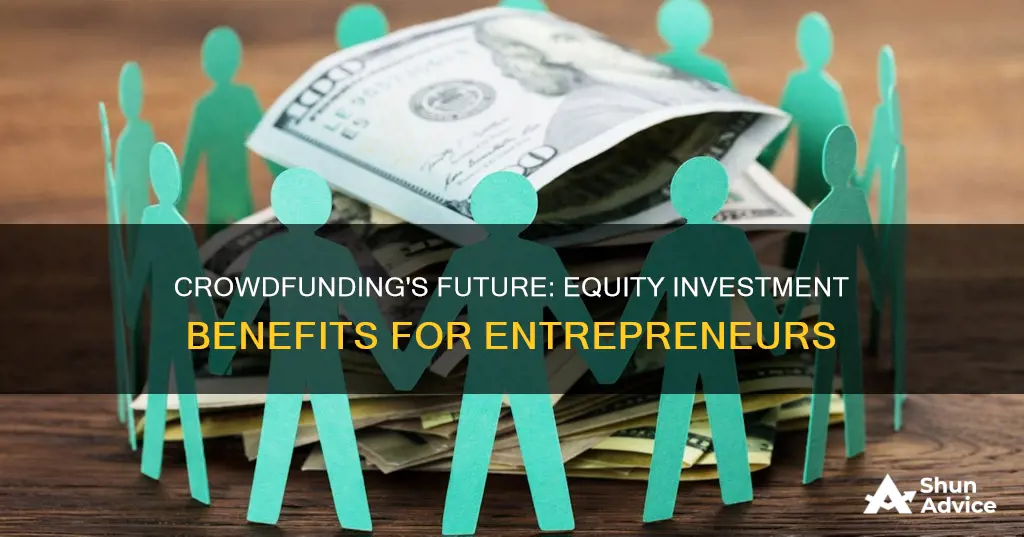
Equity crowdfunding is a method of raising capital used by startups and early-stage companies. It involves offering company securities to potential investors in exchange for financing, with each investor entitled to a stake in the company proportional to their investment. This approach provides easier access to capital, less pressure on management, and the potential for lucrative returns. However, it is important to consider the risks associated with equity crowdfunding, including the dilution of current shareholders' stakes and the high failure rate of startups. The digital nature of crowdfunding platforms, such as Wefunder and StartEngine, fosters a more liberal and open way of financing, making it an attractive option for entrepreneurs and investors alike.
What You'll Learn

Access to capital
Equity crowdfunding provides access to capital for companies that may not otherwise have been able to raise funds. It is particularly useful for companies in regions where capital is hard to come by, first-time entrepreneurs who can't raise from larger investors, and companies with hyper-local projects.
Equity crowdfunding is a method of raising capital used by startups and early-stage companies. It is distinct from other types of crowdfunding, such as rewards-based or donation-based crowdfunding, in that it involves an exchange of ownership for capital. Each investor is entitled to a stake in the company proportional to their investment.
Equity crowdfunding is also different from conventional capital-raising methods, which primarily rely on investments from a small group of professional investors. Instead, it targets a broader group of investors, aiming to raise the required capital by obtaining small contributions from a large number of investors.
Online crowdfunding platforms allow entrepreneurs and companies to showcase their projects to a larger number of potential investors, as compared to conventional forms of capital raising. This makes it easier for companies to access capital and can result in a large pool of advocates for the company.
Equity crowdfunding platforms may also pool the funds from multiple investors into a single investment, streamlining the accounting and financial reporting for the company.
Berkshire Hathaway: Investing Guide for Indians
You may want to see also

Less pressure on management
Equity crowdfunding is a method of raising capital used by startups and early-stage companies. It involves offering the company's securities to a number of potential investors in exchange for financing. Each investor is entitled to a stake in the company proportional to their investment.
One of the benefits of equity crowdfunding is that it puts Less pressure on the management compared to conventional forms of financing such as venture capital. Here's why:
No Dilution of Power
Unlike traditional financing methods, equity crowdfunding does not result in a dilution of power within a company. Although the number of shares increases, the involvement of a large number of investors means that power is not concentrated around a particular group of shareholders. This means that management does not have to deal with a single powerful shareholder or group of shareholders who can exert significant influence over the company's decisions.
More Control for Founders
Equity crowdfunding investors do not typically seek involvement in company operations. They receive equity ownership in the business but do not take board seats or actively participate in decision-making. This gives founders more control over the direction of the company and reduces the pressure on management to cater to the demands of powerful investors.
Broader Pool of Investors
Equity crowdfunding targets a broader group of investors than conventional methods, which primarily rely on investments from a small group of professional investors. By accessing a larger and more diverse pool of investors, companies can reduce the potential influence of any single investor or group.
Reduced Pressure to Succeed
Equity crowdfunding investors understand the risks associated with investing in startups. They are typically retail investors who may not have the same expectations for immediate returns as angel investors or venture capitalists. This reduces the pressure on management to deliver short-term results and allows them to focus on long-term growth.
Streamlined Accounting and Reporting
Equity crowdfunding platforms may pool funds from multiple investors into a single investment. This can streamline accounting and financial reporting for the company, reducing the administrative burden on management.
Planning Investments: A Manager's Guide to Project Success
You may want to see also

Lucrative returns
Equity crowdfunding can be a risky business, but it also has the potential to be extremely lucrative. The main idea is that investors put in small contributions in exchange for a stake in the company. If the company becomes a success, investors can make a lot of money.
Although startups are inherently risky ventures, there is always the possibility that a company may become a "unicorn" and provide very lucrative returns to investors. This is because equity crowdfunding allows investors to own a stake in the company proportional to their investment. This means that if the company does well, the value of the investor's stake increases, resulting in lucrative returns.
Equity crowdfunding is also a good option for investors who want to get involved in private investments but don't meet the criteria for accredited investors. Accredited investors are typically high-net-worth, high-earning, or well-educated individuals who have been deemed to have the financial sophistication to understand the risks associated with investing. On the other hand, equity crowdfunding is accessible to retail investors, who are not required to meet any specific criteria.
However, it is important to note that equity crowdfunding has a lower success rate than other forms of investing, such as venture capitalism. This is because equity crowdfunding platforms are often a last resort for businesses that cannot secure funding from venture capitalists, indicating that they may not have the financial stability or potential for success.
Additionally, equity crowdfunding investors should be aware of the high risk of fraud associated with this type of investing. Due to the open nature of crowdfunding platforms, it is easier for scammers to solicit investments without going through the same rigorous due diligence process as venture capitalists.
India's Pharma Industry: Investing for a Healthier Future
You may want to see also

No loan repayments
Equity crowdfunding is a method of raising capital used by startups and early-stage companies. It involves offering the company's securities to a number of potential investors in exchange for financing. Each investor receives a stake in the company that is proportional to their investment.
One of the key advantages of equity crowdfunding is that it does not involve any loan repayments. Here are some reasons why the absence of loan repayments makes equity crowdfunding an attractive option:
No Debt Burden
Equity crowdfunding does not create a debt burden for the company. Unlike small business loans or convertible notes, there are no debt repayments to be made. This means that the company does not have to worry about making regular loan payments, which can be a significant financial burden, especially for startups and early-stage companies.
Ownership and Control
With equity crowdfunding, the company is not giving up ownership or control to a single entity or a small group of investors. Instead, the ownership is distributed among a large number of investors, each holding a small stake. This allows the founders and management to retain more control over the company's operations and decision-making.
Focus on Growth
Without the burden of loan repayments, companies can focus their financial resources on growth and development. They can invest in research and development, expand their operations, or explore new market opportunities. This freedom to allocate funds according to their strategic priorities can be crucial for young companies aiming to establish themselves in the market.
Investor Relations
Equity crowdfunding investors do not typically seek involvement in the company's operations. They exchange their investment for a stake in the company, but they do not have the same level of influence as traditional venture capitalists who may demand board seats or strategic decision-making power. This means that the company can avoid the potential complexities and conflicts that can arise when dealing with powerful investors who have a significant say in the company's operations.
Simplified Accounting
Equity crowdfunding platforms often pool the funds from multiple investors into a single investment. This simplifies the accounting and financial reporting process for the company. Instead of managing repayments to numerous lenders, the company only needs to manage the distribution of profits or dividends to the shareholders.
The Star Performer: Top Investment Strategies for Your Portfolio
You may want to see also

Potential buzz and connections
Equity crowdfunding can generate buzz and excitement around your business, creating a community of like-minded people who support your company. This can lead to increased visibility and help attract additional investors for subsequent funding rounds. The process of creating a crowdfunding campaign and sharing it with potential investors can also help you build connections and gain access to a broader pool of investors than you might have otherwise.
Equity crowdfunding platforms allow you to showcase your business to a large number of potential investors, increasing the chances of your campaign being funded relatively quickly. This sends a message to the market that your startup is one to watch, which can result in increased brand visibility and awareness. The buzz created by a successful crowdfunding campaign can also lead to media coverage and further exposure for your business.
Additionally, equity crowdfunding can provide an opportunity to connect with potential customers and build a broad, engaged fan base. By investing in your company, these individuals become advocates for your brand and can help spread the word about your products or services. This can be especially valuable for companies with hyper-local projects or those where creating a strong customer base is crucial.
The digital nature of equity crowdfunding platforms also allows you to reach investors globally, expanding your network and potentially opening up new markets for your business. The connections made through equity crowdfunding can not only help with your current funding round but also position you for future success and growth.
Overall, equity crowdfunding offers the potential for buzz and connections that can benefit your business in both the short and long term. It creates an opportunity to build a community of supporters, increase brand visibility, and make valuable connections with investors and customers alike.
Equity Investment: A Financial Asset?
You may want to see also
Frequently asked questions
Equity crowdfunding is a method of raising capital used by startups and early-stage companies. It involves offering the company's securities to a number of potential investors in exchange for financing. Each investor is entitled to a stake in the company proportional to their investment.
Equity crowdfunding offers several benefits, including:
- Easier access to capital: Online crowdfunding platforms allow entrepreneurs to showcase their projects to a larger number of potential investors compared to conventional forms of capital raising.
- Less pressure on management: Unlike conventional forms of financing, equity crowdfunding does not result in a dilution of power within a company as power is not concentrated around a particular group of shareholders.
- Lucrative returns: While startups are inherently risky ventures, there is a possibility that a company may become very successful and provide high returns to investors.
There are several risks associated with equity crowdfunding, including:
- High risk of failure: Startups are risky ventures, and there is a high likelihood that the company will fail.
- Illiquidity: Securities purchased on equity crowdfunding platforms are often illiquid, limiting exit options for investors.
- Fraud: Investors must be wary of potential fraud schemes as crowdfunding is relatively new and regulations are still evolving.







